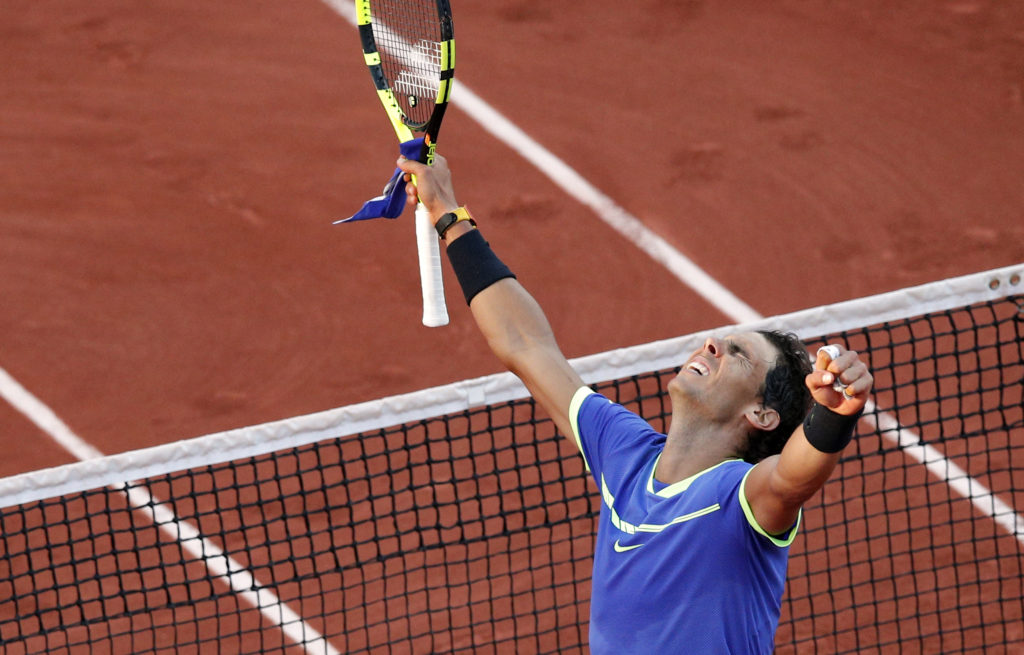
Spain’s Rafael Nadal celebrates winning against Austria’s Dominic Thiem during their semifinal match of the French Open tennis tournament at the Roland Garros stadium, in Paris, France, Friday, June 9, 2017. (AP Photo/Christophe Ena)
PARIS — Rafael Nadal acknowledged during the French Open that he’s never been all that good with numbers.
“Math,” he said, smiling as he turned his right thumb upside-down, “was the only subject that I failed in the last year that I had the chance to go to school.”
Well, perhaps he should brush up. If Nadal beats Stan Wawrinka in the final at Roland Garros on Sunday, so much of the story would be about the statistics.
It would give Nadal his 10th French Open championship, more than any man or woman has won at any major tournament in the nearly half-century professional era. It also would raise Nadal’s overall Grand Slam haul to 15, alone in second place and three away from the men’s record of 18 held by his great rival Roger Federer.
After dismissing Dominic Thiem 6-3, 6-4, 6-0 in the semifinals Friday, Nadal was asked whether No. 10 would constitute his greatest achievement, especially given the wrist injuries he dealt with last season. Predictably, the 31-year-old Spaniard shrugged, then joked: “Nine or 10 — (it’s) only 10 percent more.”
Both Nadal and his uncle Toni, who has served as a mentor and coach since Rafael was 4, have been downplaying the significance of “La Decima” — which means “The 10th” in Spanish.
“Every time we come here, we just take one match at a time, we never think about the next title,” Uncle Toni said. “But of course, if he wins Sunday, it will be very special, incredible.”
Those last two words also aptly describe his nephew’s path to this final. Not only has Nadal not conceded a set, he has dropped a total of only 29 games along the way.
“So far, so good,” as Uncle Toni put it.
A couple of other numbers: Nadal is 78-2 for his career at Roland Garros, and 101-2 anywhere in best-of-five-set matches on red clay.
“To play Rafa on clay, in (the) French Open, in a final is probably the biggest challenge you can have in tennis. He’s the best player ever on clay,” said Wawrinka, who beat Novak Djokovic for the title at the 2015 French Open. “It’s, for sure, going to be really difficult. But … it’s the final. The pressure is on both players. No one (can) go on the court thinking he has no pressure.”
Nadal is 9-0 in French Open finals.
But he hasn’t played in one since 2014, because he lost to Djokovic in the 2015 quarterfinals, then withdrew from the tournament before the third round last year due to an injured left wrist.
That wrist propels his intimidating, topspin-heavy forehand, which might be the best shot in the game when at its best. Another contender for that accolade: Wawrinka’s flat one-handed backhand, which is so smooth and so dangerous.
Because 2015 French Open champion Wawrinka is a righty, and Nadal’s a lefty, when Wawrinka hits his backhand cross-court — his preferred destination — it will wind up heading toward Nadal’s forehand.
Quite a matchup.
It worked in Wawrinka’s favor (as did his opponent’s bad back at the time) when he beat Nadal in the 2014 Australian Open final. Wawrinka had lost all 12 earlier matches against Nadal; their series currently stands at 15-3.
After playing most of his career in his Swiss countryman Federer’s considerable shadow, Wawrinka — at 32, the oldest men’s finalist in Paris since 1973 — has blossomed lately. He is 3-0 in Grand Slam finals, beating Djokovic at the 2015 French Open and the 2016 U.S. Open.
“Stan is a big obstacle. But all the players are. He is a very good counter-attacker,” Toni Nadal said. “He won all the finals he played in Grand Slams, and Rafael never lost a final here. Let’s see who will be the first one to lose.”

